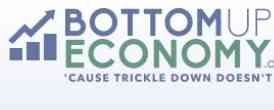WHY WE MUST JOIN THE BOTTOM UP ECONOMY DEBATE

There are many reasons why Anthony Flaccavento couldn't stop talking and writing about the need to expand the local “bottom-up economy” success story.
Wall Street nearly collapsed in 2008, sparking a global economic downturn, causing millions of people to lose their jobs, and forcing widespread layoffs from local and national institutions. The economic recession also shows how vulnerable most communities have become, especially in rural areas of the United States. At the same time, more and more evidence of climate change surrounds us, from rapidly melting glaciers and the polar caps of Antarctica to prolonged droughts and other adverse weather conditions. The problem is not just the atmosphere: in the last 100 years, the amount of productive land available per capita has drastically decreased, from 14 acres per capita worldwide to just over 3.5 acres.
Can we get rid of this situation, or do we need a new approach, a new vision of prosperity?
Many Americans equate democracy with a free market, believing that without "free market" capitalism there can be no political freedom, and any restrictions on the market, whether it is restrictions on consumers or on businesses and companies, are Violation of political freedom, democracy.
However, from Arizona to Vermont, Anthony "Tony" Fracavento and many others helped promote the emergence of a very different reality, where the health of the local community and the prosperity of ordinary people were the starting point. These bottom-up emerging economies recognize the power of the market, but they also recognize its limitations and problems.
Farmers, entrepreneurs, and activists in these communities are writing a new story. The story unfolds like this:
The “economy” consists of dozens of smaller regional economies, and these economies are based on the economics of families, communities, and communities. Activity-based. Community. The emergence of the new economy makes people's lives better, more fulfilling, happier, and safer because after all, the economy serves people, not the other way around. This is a shift from dependence on consumers to the elasticity of production.
These local and regional economies are based on diversified enterprises, ranging from more traditional to newer and more experimental enterprises, but all have close ties with local communities. These companies are increasingly realizing that they must not only serve their customers and employees, but they must also respect where they live, find ways to conduct business with gifts and respect the boundaries of their ecosystem. This is the transition from trickle-down problems to bottom-up life solutions.
These emerging economies are using the advantages and assets of their specific regions, including culture, people's unique abilities, the built environment, and the natural world. In this way, the development of companies and the economy is different, not general, and cannot be easily replaced or outsourced. Ownership of these companies is mainly in private hands, but increasingly they belong to workers, producers, clients, or communities. It is a shift from concentrated wealth to worker ownership and community capital.
As they seek to solve problems through the economy and build community wealth, they are also establishing regional and national learning and communication, public speeches, and policy networks to strengthen and expand their work. This is the transition from a thousand flashes to interconnected networks to learn, do and change.
While respecting their history and traditions, these increasingly active communities are also fostering social entrepreneurship and supporting economic innovation, new forms of media and art, community design, and civic participation. They are revitalizing the public and private spheres. This is a shift from focused corporate media to stimulating citizen dialogue.
Most importantly, these emerging economies and vibrant communities start to ask themselves "How will we create jobs?" But "What is the job to be done?" In this way, based on people's health and well-being and the prosperity of the community, Basic economic choices are becoming basic public choices. This is a shift from lobbying and monetary policy to community-based participation policy.